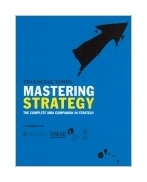|
||
• wydawnictwa polskie
• Zamów informacje o nowościach z wybranego tematu • kontakt
• Cookies na stronie |
MASTERING STRATEGY. THE COMPLETE MBA COMPANION IN STRATEGYwydawnictwo: FT/PH , rok wydania 2000, wydanie I cena netto: Financial Time Mastering Strategy The Complete MBA Companion in Strategy The Financial Times Mastering series has grown out of a unique partnership between the /Tand some of the world's leading international business schools. Mastering Strategy is the seventh book to emerge in this way and brings together, in a fresh format, articles that first appeared in the newspaper over a 12-week period in late 1999. As with its predecessors, Mastering Strategy combines the most important principles of this area of management with new thinking on what direction it will take in the 21st century. Many books have been written about business strategy over the last 40 years, but few offer the variety of perspective and subtlety of interpretation as the contributions in this book. The dawn of a new millennium - with businesses striving to navigate the fast-moving currents of liberalization, globalization, and e-commerce to name but three - is surely an appropriate time for executives to stand back and consider the theory and practice of the strategic art. The old certainties of central and long-term planning may have fallen apart long ago, but what exactly has replaced them? Should companies primarily be looking outwards at their external environment - or inside at their distinctive capabilities? How do managers choose from the competing schools of strategy - and is it possible to synthesize the different approaches which have been tested over the years into a coherent whole? There are no easy answers to these and other questions but our hope is that the ideas in this book will better inform readers and stimulate them to develop the most appropriate model for their own circumstances. Mastering Strategy has 16 modules - chosen in part to reflect the way the topic is taught in leading international business schools and in part for editorial expediency. As with the study of all management topics these days, however, the reader should beware of over-neat functional distinctions. The 16 modules cover strategy as it relates to: history; micro-economics; the general business environment; globalisation; organisational structures; technology; mergers and acquisitions; shareholder value/governance; risk management; leadership; people; sectoral approaches; alliances; knowledge; operations and manufacturing; and future challenges. This is a rich mix of topics and readers will find everything from the dynamics of price competition and resource margin accounting to post-acquisition behaviour and the perils of corporate "thought control." New thinking sits alongside useful definitions and discussion of more familiar but not always well understood concepts such as network externalities, strategic complements and scenario analysis. As with previous books in the FT Mastering series, the emphasis on case studies and examples ensures that the link with the real world of business remains strong. Brief introductions to each module outline the main themes, and the summaries accompanying each article are intended to help readers quickly identify particular areas of interest. Lists of further reading should be helpful for those who want to delve deeper or look up references. As with previous books in this series, the insoiration for and compilation of the articles in Mastering Strategy was a team effort, involving representatives of the four participatning business schools: University of Chicago Graduate School of Business; INSEAD, near Paris; University of Michgan Business School, Oxford University. All the co-ordinators mention on page vi provided invaluable support, but Rob Gertner and Will Mitchell deserve a special mention for combining consistently astute and encouraging advice with a burdensome individual writing role. The other heroes, of course, are the professors and other business school faculty experts who gave generously of their time to write the 60 or so articles around which Mastering Strategies based, who stuck to deadline undertakings they no doubt later lived to regret, and who endured with surprising cheerfulness the editing peculiarities of the FT Mastering team. Finally, if you enjoy this book, you will be glad to know that there are more Mastering books on the way. The next book in the series will be FT Mastering Risk. Tim Dickson Tim Dickson is executive editor of European Business Forum, a new print and online publishing business which aims to highlight Europe's perspective on global management issues. EBFis a joint venture established by the Community of European Management Schools (GEMS) and PricewaterhouseCoopers. Tim can be contacted at tim.dickson@europeanbusinessforum.com
Księgarnia nie działa. Nie odpowiadamy na pytania i nie realizujemy zamówien. Do odwolania !. |


